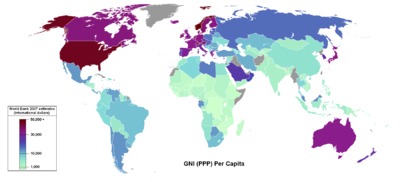- IQ and the Wealth of Nations
-
 QI moyen calculé et/ou estimé par Richard Lynn dans IQ and Global Inequality.
QI moyen calculé et/ou estimé par Richard Lynn dans IQ and Global Inequality.
IQ and the Wealth of Nations (en français : Le quotient intellectuel et la richesse des nations) est un essai publié en 2002 par Richard Lynn, professeur émérite de psychologie à l'Université d'Ulster (Irlande du Nord) et Tatu Vanhanen, professeur émérite de science politique à l'Université de Tampere (Finlande)[1]. Ils y défendent une thèse selon laquelle il existerait une corrélation entre le revenu national brut par habitant et le quotient intellectuel moyen de la population. Les auteurs interprètent cette corrélation comme une mise en évidence du fait que le quotient intellectuel serait un facteur important des différences en matière de richesse nationale et de taux de croissance économique, c'est-à-dire que l'intelligence des populations serait le moteur du développement.
Cette interprétation peut sembler en contradiction apparente avec l'effet Flynn, qui montre que le QI moyen dans les pays industrialisés a augmenté dans la seconde moitié du XXe siècle (cette tendance s'est inversée depuis les années 1990[2]), et notamment dans les catégories sociales défavorisées, indiquant que la valeur du QI pourrait être liée à l'amélioration des conditions de vie. Le chercheur Nigel Barber montre ainsi, à partir des résultats d'IQ and the Wealth of Nations, une corrélation positive internationale entre le QI et le niveau d'éducation, et une corrélation négative entre le QI et la proportion d'agriculteurs, ainsi qu'avec le poids des nouveau-nés[3]. Le rôle de l'alimentation sur le QI est également démontré. En particulier, les carences en oméga-3 font obstacle au développement intellectuel[4],[5]. Toutefois, cette corrélation n'est pas vérifiable avec l'Asie et en particulier la Chine.
Les données, la méthodologie et les conclusions de l'étude de Richard Lynn et Tatu Vanhanen ont fait l'objet de nombreuses critiques[réf. nécessaire]. Ceux-ci ont réaffirmé leurs positions et donné leurs réponses à ces critiques dans un autre ouvrage paru en 2006, IQ and Global Inequality.
Voir aussi
Références
- (en) Richard Lynn, Tatu Vanhanen, IQ and the wealth of nations, éd. Praeger Publishers, Westport, 2002, 320 p. (ISBN 0-275-97510-X et 978-0275975104).
- (en) Thomas W. Teasdale et David R. Owen, « Secular declines in cognitive test scores : A reversal of the Flynn Effect », dans Intelligence, vol. 36, 2008, p. 121 [lien DOI]
- (en) Nigel Barber, « Educational and ecological correlates of IQ : A cross-national investigation », dans Intelligence, vol. 33, 2005, p. 273 [lien DOI]
- (fr) Nicolas Rousseau, « Le DHA, cerveau des transmissions nerveuses ? », dans Health & Food, no 58, mars-avril 2003 [texte intégral]
- (en) Robert Winston, The human mind, BBC, http://www.bbc.co.uk/science/humanbody/tv/humanmind/
Catégories :- Livre en économie
- Controverse en économie
- Essai paru en 2002
- Psychométrie
- Intelligence
Wikimedia Foundation. 2010.

